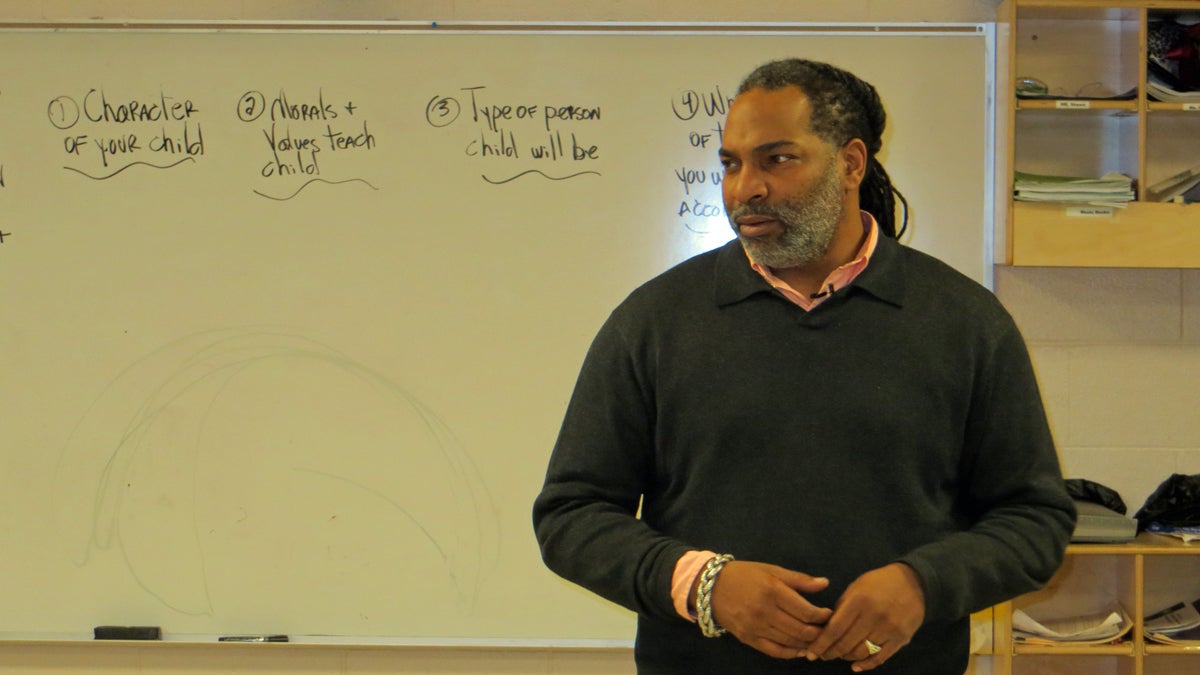Teaching men to be better fathers – does dad training work?
Listen
Trainer Joel Austin leads a weekly support group at the West Philadelphia YMCA for fathers working to be better dads. (Taunya English/for The Pulse)
Each week, a group of fathers meet at the West Philadelphia YMCA to work on their parenting skills.
From self-esteem to behavior, there’s little debate that a dad’s active, consistent presence makes a child’s life better. It’s less clear if you can actually teach fathers to be involved and still reap the same benefits for kids.
Even without hard proof about the effectiveness of ‘responsible fatherhood’ programs, the government is investing big. There are many efforts underway to get social workers and nonprofit agencies to include fathers in whatever they’re trying to accomplish—whether that’s preventing teen pregnancy or teaching kids to read.
About six to 10 fathers stop by the West Philadelphia YMCA each Tuesday evening to talk and work on their parenting skills.
Joel Austin leads the Fathers Club support group in his free time, but he also owns a company—Daddy University—that trains community groups to engage dads.
Austin, who is a dad to three sons and a daughter, says social-service agencies and the courts often don’t step in to train and support fathers until after a family needs fixing.
“We don’t do prevention very well,” Austin said. “A lot of people get paid for uninvolved fathers. The prison system, the juvenile system, WIC – is because you are not around. Welfare is because you are not around. Everybody gets a lot of money when you step off from your kid.”
The Tuesday-night discussion at the YMCA starts with a disagreement over Nick Foles and Michael Vick, but there’s an equally lively debate over the staying power of braids or barrettes. Lots of the dads in the room have experience–and opinions–about how best to keep a third-grader’s unruly hair in check.
The fathers learn about child development, how to negotiate with a toddler, and they commiserate over clashes that happen as they try to co-parent with wives and partners.
A weekly check-in
The club is run a lot like a 12-step meeting with each dad checking-in about how his week went.
One man mentions that his youngest son is living in Texas with the boy’s mother, and he misses him. Another dad who has primary custody of his 12-year-old daughter gets a little laugh when he talks about the trials of parenting a ‘tween’ girl.
“I’m trying to stay one step ahead if I can,” Kevin Davis said. “I’m learning.”
Each week, Austin and the group’s co-leader, Sabir Alim, teach a formal lesson. Recently they talked about setting house rules and reinforcing consequences. Thirty-three-year-old Ted Smith reports that he’s had some success getting his four-year-old daughter to clean her plate without much fuss.
“We were both happy,” Smith said.
Little evidence on effectiveness
The dads at the YMCA say their group is a success, but researcher Jay Fagan says most fatherhood programs haven’t taken the extra steps to measure the influence of the intervention on kids’ wellbeing—or health.
“There’s very little evidence saying that it works,” Fagan said. “Folks really don’t know what impact they have on fathers and families.”
Still, there are many believers, and the federal government spends tens of millions of dollars each year to get fathers more involved in their children’s lives.
In 2005, the Department of Health and Human Services designated $150 million over five years to fund a number of programs. In 2010, the government earmarked another $75 million a year for three years.
Fagan and his team at Temple University now have a government grant to study whether that investment is paying off and to figure out which approaches are most effective.
“The question of what it means to be a responsible father–there’s not a real clear definition of what we mean by that. It is culturally based,” Fagan said.
Discussing discipline
Meanwhile, at the YMCA, Joel Austin continues to share what he thinks works to make fathers better dads. Lately, he and the group have been talking about discipline.
“If you want to raise someone who’s strong-minded and speaks their mind, you can’t smack them upside the head every time they ask you a question or open their mouth,” Austin said. “If you want someone loving, more men are going to have to say things like ‘thank you, you’re welcome, I love you, I miss you.”
Austin challenges the dads to discipline without physical punishments, but several of the fathers have questions. Several say their parents kept them in line, just fine, with a tap on the butt or a belt.
“So you’re thinking there’s no reason for a child to be spanked?” Ted Smith asks.
Austin answers with a story from when his son was young.
“I busted into his room because of something that he had done. I had started to spank him,” Austin said. “When I looked at him for a second and I realized he wasn’t getting me; he was afraid of me.”
Since then, his strategy has changed.
“I use other tools,” Austin said. “I’ll take a cell phone in a minute.”
On June 7, Daddy University is holding a Fatherhood Conference at the Pennsylvania Convention Center including workshops on health, legal rights and parenting.
Fatherhood is also on the agenda at the Black Male Development Symposium at Arcadia University on May 10.
Links and resources
Responsible Fatherhood Toolkit: Resources from the Field
WHYY is your source for fact-based, in-depth journalism and information. As a nonprofit organization, we rely on financial support from readers like you. Please give today.



